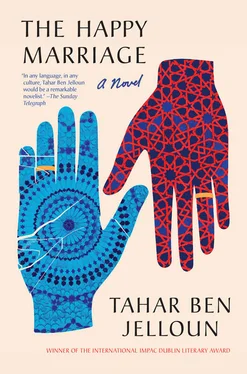I can discharge you any time I feel like it.
— Mrs. Muskat to Liliom, FRITZ LANG, Liliom
It was a gorgeous hand-embroidered blanket that had been crafted in Fez toward the end of the nineteenth century. It was a little worn and it hadn’t endured the ravages of time. One of the painter’s Moroccan friends, who was knowledgeable when it came to embroidered cloths, had offered it to the couple as their wedding present. It was so beautiful and precious he had wanted to have it framed and hang it as though it were a painting. Before doing that, he’d stretched it out as carefully as possible on a low-lying table that he hadn’t liked at all — neither the wood nor its shape — but which was the sort of typical table one would find in most homes. Gracefully situated in the middle of the living room, it covered up what was an ugly piece of furniture, but had also made the room far more beautiful. The painter had done some research on embroidered cloths crafted in Fez during the previous century and had been surprised to learn that it had once belonged to the family of his maternal grandfather. It had been a part of Lalla Zineb’s trousseau. Lalla Zineb had been the daughter of Moulay Aly, a professor at the University of al-Karaouine. The cloth had become priceless in the painter’s eyes! Not only because it was beautiful and unique, but also because it was a part of his family heritage. Truth be told, it was the only wedding present they’d received that he truly liked. The others had been so unoriginal that he’d quickly forgotten all about them. That wasn’t the case with his wife, who scattered those presents all over their house, especially their bedroom, giving them pride of place: vases, decorative plates, sheets embroidered by little hands, synthetic wool blankets, coffee sets that imitated the English style but were almost certainly made in China, bouquets of plastic flowers made to last forever, and a whole host of other trifles whose only purpose was to sit on a shelf and serve as a reminder that the wedding had been a nice party, while one wisely waited until the dust wrapped them up in two thick layers of dirt.
On his return home one evening he’d discovered that the cloth was missing. His wife had tossed it into the laundry basket. The painter fetched it out, folded it carefully, and put it in one of his closet’s drawers. He thought about the dainty hands that had spent weeks embroidering that little piece of cloth, about the man or woman who’d designed those flowers and picked the colors. The painter was very upset. To think that cloth had survived two World Wars, the French Protectorate in Morocco, and the country’s subsequent independence, and had belonged to three or four different families before winding up in the window display of a sophisticated antique dealer so that one of his friends could buy it and offer it to them as a wedding present! In the face of all of that, it was difficult to interpret his wife’s gesture as anything other than crudeness, at best, or, at worst, even ignorance. He had wanted to find her so he could speak to her about the importance he attached to those objects from the past. However, he had noticed that his wife hated lessons. She might even make some kind of disingenuous retort like: “But what is that old rag? My house isn’t some bazaar!” At first he thought he could forgive her, talk to her tenderly, explain himself, teach her how to admire a work of art, tell her that one could read an embroidery as though it were a poem, that one could decipher an old carpet just as one follows the footsteps of an ancient civilization, and so forth.
He’d withdrawn into his study and had asked himself why that whole affair over the cloth had so profoundly hurt his feelings. Up until that moment, their love had always been stronger than that. Some elements of his wife’s behavior had shocked him, but he’d been able to overcome them. But he couldn’t stomach this; it just wouldn’t do. It would be impossible to forgive her. What she had done was irreparable, and it was the first time he’d thought they could one day separate. The evening went by and the painter didn’t broach the subject with his wife at dinner. Later that night, he laughed at himself for how angry he’d been.
Once their son was born, his wife gained a great deal of confidence and her attitude and behavior underwent a vast transformation. The cloth incident was followed by daily disputes. Each time this happened, he would leave the house and go for a walk around Paris. He hated going to bars. Instead, he roamed the streets muttering to himself with his clenched fists in his pockets.
Late one evening, he stopped in front of the window display of a television store, where the screens were broadcasting a documentary on music from the High Atlas Mountains. The audio was muted, but the sight of those women in multicolored robes and those men in white djellabas tapping on bendir drums while others played the flute was so intense that he was unable to avoid wanting to hear that shrill, disharmonious music that they’d played just before their marriage. It was a memory he’d tried to forget, but which resurfaced at that exact moment.
He’d never liked folk music, regardless of whether it came from his country or anywhere else. But when the planning for their wedding had been under way, nobody had wanted to take his opinion into consideration. There couldn’t be a party without music and there couldn’t be a great banquet without a lot of noise. Even though the painter had dreamed of a small wedding attended only by friends or at most a few relatives, he’d found himself caught in a whirlwind of hullabaloo.
Throughout that evening, despite the happiness the painter had felt at marrying his wife, he’d looked as though he’d been in a daze, which was very uncharacteristic of him. His gaze had even grown anxious when he’d met his father’s eyes, who’d been bitterly opposed to the match since he could see neither the need for it nor its merits. His mother had worn her prettiest caftan, her gold belt and her finest jewelry. Yet even she had been vexed by the difference in class that her son had subjected her to. His other relatives had shared that opinion and he’d been able to read it in their tense features. The painter’s aunt, who was known for speaking bluntly, had even been told to keep her mouth shut. After all, they weren’t there to quarrel and cause a scandal. As for his new in-laws, the women had done their best to go with the flow. But their eyes betrayed words left unspoken. Each side wore different clothes, and employed different gestures too. Only the music, with the sound system turned up to the max, deafening everyone there, had prevented the situation from becoming explosive and turning into a disaster. Nobody present had been happy, apart from the painter and his wife. Nobody had wanted them to get married. One had to be absolutely crazy to want to bring such different worlds together.
The painter was assailed by another memory from their wedding. That of the clove perfume worn by all the women who belonged to his tribe. The smell of it had made him feel nauseous ever since that day when he’d first smelled it as a little boy when he’d been traveling with his parents in their car. It was as though he were allergic to it, and every time he smelled it he would experience head-splitting headaches that would torture him for hours on end.
Everything about that wedding had been calculated to put him down, and yet he’d braved it. He felt a boundless tenderness for that girl he believed was free and beyond the reach of his tribe. He looked at her and covered her with kisses, holding her tight in his arms and stroking her splendid hair, which had a blonde sheen to it. He was in love. Blindly in love. No other woman on earth seemed as charming to him, even though he’d lived the life of a seducer who’d accumulated a great many experiences throughout his travels and encounters.
Читать дальше












